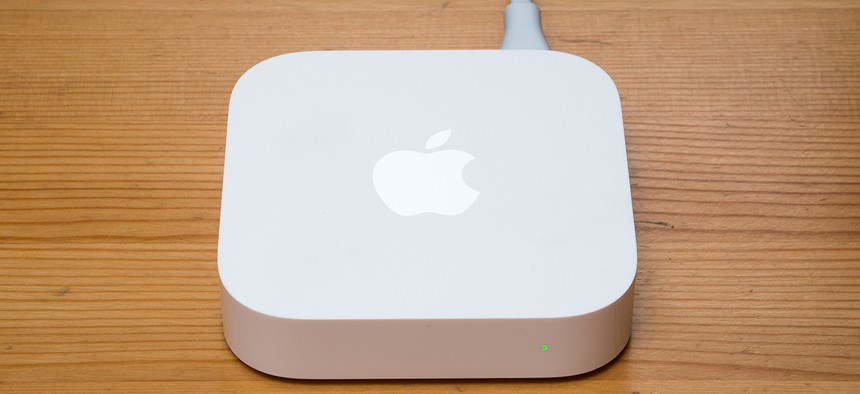Apple Is Reportedly Going to Stop Making Wireless Routers

Canadapanda/Shutterstock.com
The company will shift employees onto other projects including Apple TV, the company’s standalone streaming device.
The company forcing its customers to go wireless by removing ports from all of its devices is reportedly going to stop manufacturing wireless routers. According to Bloomberg, Apple will be getting out of the router market and will shift employees onto other projects, including Apple TV, the company’s standalone streaming device.
Apple, which has not yet commented on the report, currently sells three router models under the AirPort brand, at prices ranging from $100 to $400. It hasn’t refreshed any of these products since 2013, as Bloomberg points out.
While it’s not clear how much of Apple’s revenue is generated by AirPorts, the products aren’t huge sellers. In Apple’s quarterly earnings disclosures, AirPorts are bundled into the “Other Products” bucket, along with the Apple Watch, Apple TV, iPod sales, and Beats Audio headphones. Together, they make up Apple’s smallest revenue category, generating roughly $2.4 billion of the $18.7 billion the company brought in last quarter.
It’s not entirely clear what Apple’s rationale for leaving the wireless business would be, especially as technology is becoming increasingly mobile, and wireless. Apple’s newest laptops only have USB-C ports, meaning any older devices users might want to use with them—such printers, cameras and iPhones—have to be connected through a confusing series of adapters, or wirelessly. Apple routers have functions, such as playing music wirelessly, compatible only with Apple products. Bloomberg argues by killing off its routers, Apple is inviting the possibility of Mac owners buying non-Apple computers to go with their future, non-Apple routers.
But it’s possible Apple is looking to ensnare users in its ecosystem in other ways. Bloomberg also reports some engineers would be moving to Apple’s TV division. In its current form, Apple TV is a device that wirelessly connects to a router to stream movies, shows and games to a screen. Perhaps by bringing in engineers who understand connectivity and networking, Apple is setting up Apple TV to play a larger role in an internet-connected home.
In recent years, Google and Amazon have introduced voice-activated devices that can control internet-of-things devices, as well as stream music (and in Google’s case, video, if you have a Chromecast). Apple brought its voice assistant, Siri, to its most recent version of Apple TV in 2015. It also fleshed out an app called Home, which allows iPhone owners to control every IoT device in their home from the app. The company has been lacking a standalone, voice-controlled hub like Google’s Home or Amazon’s Echo, but perhaps instead of building up a new device from scratch, it’s planning to add Wi-Fi to a streaming device people already know, and in some cases, love.
Apple has been struggling to find a lower-cost device to stuff stockings with, as it once had with the iPod. Falling iPhone sales, coupled with relatively flat sales of all its other products, are only adding to that pressure. Last month, the company posted its first year-over-year sales drop since 2001.
Some believe new products, like a pair of smart glasses, may be the answer; others think the Apple Watch could still become a hit. But given the unexpected success of the Amazon Echo and the initial response to Google Home, perhaps the answer for Apple has been sitting under our televisions this entire time.
NEXT STORY: Patent Office Joins Open Source Movement





